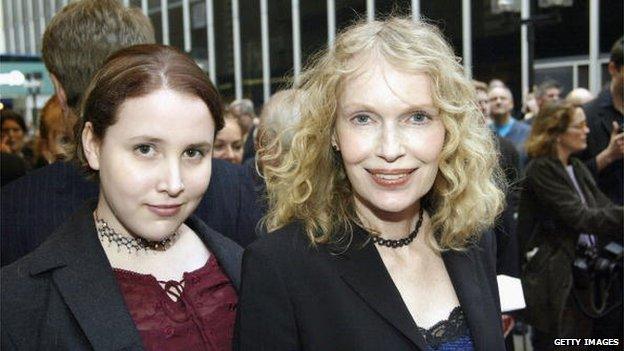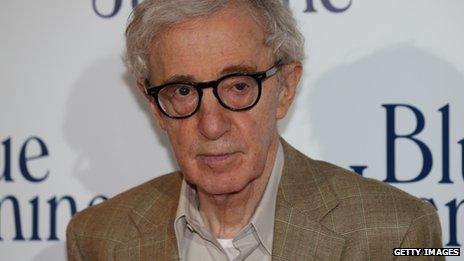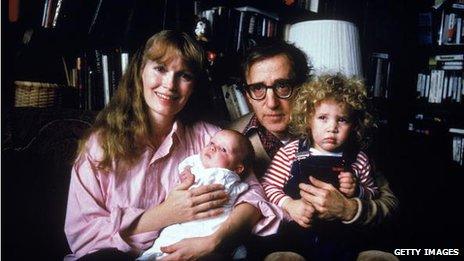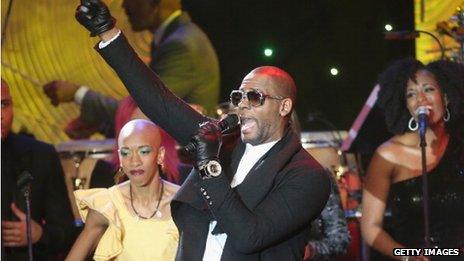Woody Allen row and 'celebrity abuse'
- Published

Dylan Farrow, shown with Mia Farrow in 2003, wrote a letter to the New York Times about Woody Allen
Film director Woody Allen's adopted daughter Dylan Farrow has renewed her allegations of sexual abuse against him. Although in the past prosecutors did not find sufficient evidence to charge him, her accusations have forced the issue into another venue - the court of public opinion.
Dylan Farrow said that Woody Allen molested her when she was seven years old.
"He talked to me while he did it, whispering that I was a good girl, that this was our secret, promising that we'd go to Paris and I'd be a star in his movies," she wrote in a letter, external published by the New York Times.
Now 28 and living in Florida, she recalls looking at her brother's electric train set while the alleged abuse took place.
This is the first time she has written about the subject in a public forum, though allegations surfaced in 1993 during the breakup of Mr Allen and his former girlfriend Mia Farrow.
Woody Allen's lawyer, Elkan Abramowitz, has fought back against the allegations, blaming Mia Farrow.
"It is tragic that after 20 years a story engineered by a vengeful lover resurfaces after it was fully vetted and rejected by independent authorities," Mr Abramowitz told US media.
One of Mr Allen's colleagues, Robert B Weide, an Oscar-nominated filmmaker, also cast aspersions on Mia Farrow.
"It's understandable that Mia would remain furious with Woody for the rest of her life. If I were in Mia's position, I'm sure I'd feel the same way. (Though I'd likely handle it as a private matter and not be tweeting about him being a pedophile, just before tweeting, 'omfg look at this baby panda')," Mr Weide wrote in a piece that appeared in the Daily Beast, external.
Other friends of Woody Allen have defended him - in some cases, for years - pointing out that he has never been prosecuted.
The director is currently nominated for a best screenplay Oscar for his 2013 movie Blue Jasmine. It would be his fifth Academy Award if he wins at next month's ceremony.

Woody Allen has won four Academy Awards and been nominated for 19 more
Cases of celebrities who have been accused of sexual abuse have unfolded with unsettling frequency in the UK and the US in recent years. A report co-authored by Britain's Scotland Yard police force described more than 200 cases of abuse by BBC television presenter Jimmy Savile, who died in 2011.
Most of the victims were women and girls - some as young as eight. The crisis at the BBC led to the resignation of George Entwistle, the director general, and to other changes.
In the US, meanwhile, Jerry Sandusky, the former Penn State football coach, was sentenced to 30-60 years in prison for sexually abusing boys.
One of the consequences of these high-profile cases is that people are more willing to hear accounts from victims. In addition, stereotypes have been questioned.
"We don't like to believe that our heroes are capable of despicable acts - acts that we would condemn if a bus driver were involved," said Jim DeRogatis, a music critic.
When allegations surface, people are less willing to accept a celebrity's denial of the accusations than they were in the past.
Mr DeRogatis has written extensively about another celebrity accused of sexual abuse, the R&B star R Kelly.
In 2008, a jury found him not guilty of 14 charges, including making a sex video with a 12-year-old girl.

Happier times? Mia Farrow, Woody Allen, son Satchel (now known as Ronan) and Dylan posed for a portrait in 1988
The court case may have been forgotten or ignored by some people because they liked his music. But for others, once such serious accusations have been put in the public arena, a not-guilty verdict does not end suspicion.
The German writer Friedrich Hebbel once said: "In a good play, everyone is right."
This standard holds true for news stories, too, especially those about subjects that are emotionally charged and involve facts that are hard to check.
In many of the stories about Woody Allen, though, ambiguity is discounted.
Some people believe Dylan Farrow; others think she imagined the incident - and that Woody Allen has been unfairly maligned.
Generally speaking, though, popular sentiment now favours those who say they have suffered abuse. Rather than focusing on rights of the accused, the emphasis is placed on the rights of victims.
"There has been a shift in our culture from a tendency to dismiss claims of rape and child abuse to a culture that is sometimes too quick to believe allegations," said David Greenberg, a history professor at Rutgers University.
"It's like society has to account for previous discounting of rape allegations to a point where we want to convict without a trial."
Society has changed in other ways, too. Years ago artists were supposed to be rebels.
"In the past artists stepping outside of social boundaries was what art was all about," said Laura Kipnis, the author of How to Become a Scandal, which looks at individuals who transgress social boundaries.
"Now we want our artists to uphold social mores."
She believes that pendulum has swung too far. Now charges are sacred, and accusations fly.
"Everyone's claiming the victim status," she said.

R Kelly has faced accusations of having sex with an underage girl and filming it but was acquitted on all charges
Perhaps. It is also possible that people today have a more complicated view of the artist - and of celebrities.
"We don't know what happened, and the only intellectually honest position is uncertainty," said Mr Greenberg.
"How could anybody know but the people involved? And given what we know about false memories, how could we ever know the truth?"
For that reason it makes sense to listen to both sides.
The truth may never come out, but at least readers will have a more complete picture - and a better understanding of how cases affect both the accuser and the accused.